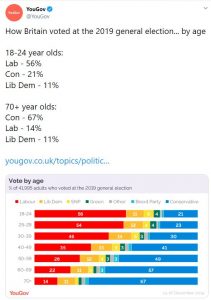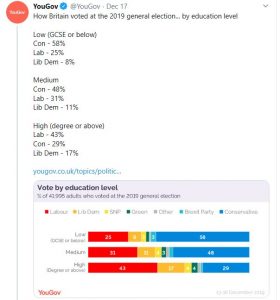The UK is still reeling from the election results of a few days ago, in which Boris Johnson’s Conservative Party not only won a majority, but did so by capturing many traditional working-class seats across the north and midlands of England. Australia has experienced a similar election recently, whilst the US got there first with the surprise election of Trump in 2016. The devastating surprise in all of these elections seems to lie in how far working class people are prepared to vote against what seem clearly their own interests: namely, against improvements in the public spending they rely upon, and in favour of grossly inconsistent right wing governments, supported by big business interests who evade tax and impose exploitative working conditions on them. That’s even before we get onto the pressing issue of climate change, where all our interests are deeply threatened, and the right wing responses are generally either denialist or inadequately weak. The jokes about turkeys voting for Christmas have abounded.
But beyond that, how can we helpfully understand and learn from the underlying problem here? Very few analyses seem to drill down to the most basic issue, which is one of human judgement. Applying the Middle Way, one tries to avoid absolute assumptions, whether negative or positive – which in this case probably means avoiding the single cause fallacy. Why, then, do so many working class people – whether in Workington, Brisbane or Des Moines – persist in voting like turkeys? It’s very easy to take one kind of explanation and absolutise it, in accordance with the particular political concerns your experience has equipped you with, but in the process avoid the most basic underlying issues. We can blame leaders, we can blame biased and sometimes false media coverage, we can blame party policies and manifestos, we can blame party tactics, or even voter stupidity. All of these factors are no doubt part of the picture, but they need to take their place in relation to the question of human judgement. What actually decides the values that actuate people when they cast their vote?
In understanding this, I’ve found the following video from Rebel Wisdom helpful. It mentions a couple of things that I think are very relevant. One of these is the analysis of six foundational political values by Jonathan Haidt (authority, loyalty, sanctity, care, justice, freedom) – see my review of his book. Another is an idea that comes from Ken Wilber – the pre/trans fallacy: namely that people often react against a later stage of integrative development that has incorporated the more helpful elements of an earlier one, because they mistake it for the earlier stage. I do recommend watching the video if you have time, although it’s 35 minutes long. It doesn’t answer all the questions that I think need to be asked (which I continue with below), but it provides a very good starting point.
Where this video leaves us is with the idea of “performative contradiction”, namely the idea that the left contradicts itself unconsciously by committedly extolling the values of care and justice, but doing so in a way that feels exclusive to working-class people. Whilst I think that’s a good point, I also think it’s not sufficient to leave it there, because it has the implication that the left is to blame for being too exclusive by being intellectual, middle class etc, when these are largely just part of the conditions that middle class left wingers are working with.
However, if we take the six foundational values of Haidt and probe them further, we can start to ask what the values of working class people may be, and why they are opposed to those of middle class left wingers. The obvious answer seems to lie in those values identified by Haidt as more collective ones: authority, loyalty and sanctity. Haidt’s major point is that conservatives combine these three values with the others (care, justice and freedom), but ‘liberals’ (in the American sense) concentrate only on care, justice and freedom and fail to understand why anyone values authority, loyalty or sanctity. This is also somewhat hypocritical of the left, of course, because left wingers, being human, do have their own values of authority, loyalty and sanctity, but they tend to confine them to private life (family, friendships, religion, maybe business or professional relationships). Left wingers just don’t feel it’s appropriate to make political judgements on the basis of authority, loyalty or sanctity, meaning that they are more likely to be anti-elite, internationalist and anti-religious.
But do the working classes share these ‘left wing’ or ‘liberal’ types of value? It seems obvious to me that the majority do not, and the psychological preferences of the majority help to create cultural trends that subsume many more (such as the popularity of Brexit). Why, then, have working class voters in industrial towns across northern England traditionally voted Labour? Obviously care, justice and freedom are of some concern to these voters, but they are not prepared to use them as a sole basis of judgement without a good helping of authority, loyalty and sanctity to help them along. In traditional industrial northern England (where I spent much of my childhood) these sources of authority, loyalty and sanctity were clearly present in working class culture. Socialist leaders, some of working class origins, provided authority. Working class solidarity itself, particularly exercised through the unions, the pubs and the churches, provided the basis of loyalty. In the past, voting Tory would have been an unthinkably disloyal thing to do. Sanctity, too, was present in the power particularly of non-conformist Christianity in the earlier Labour movement. Even in the 1970’s, when I was growing up amongst the small towns south east of Manchester, the churches of each town would all parade with their banners and assemble outside the town hall, dressed up in pride for the ‘Whit Walks’ every Whitsuntide Sunday: a display uniting the sanctity and solidarity of the churches, the town and civic society (see this link for pictures: one of which is here).  However, under the impact of social and economic change, these sources of value are largely gone: church attendance has plummeted, pubs have closed, and unions have been seriously weakened. The left has become an increasingly middle class phenomenon, including those who may have been born into the working class but adopted middle class culture and expectations. The working classes are left to rudderless individualism.
However, under the impact of social and economic change, these sources of value are largely gone: church attendance has plummeted, pubs have closed, and unions have been seriously weakened. The left has become an increasingly middle class phenomenon, including those who may have been born into the working class but adopted middle class culture and expectations. The working classes are left to rudderless individualism.
I think there’s a further theoretical perspective that can shed light on this: that’s the work of Robert Kegan on the stages of adult psychological development. Kegan extended the work previously done by Piaget on how children develop, in the process identifying some quite well-definable stages in both the cognitive development and the changing values of adults. The video below gives an introduction to the five stages of development in Kegan’s thought.
The vast majority of adults are at either what Kegan would call the ‘interpersonal’ stage (stage 3), or at the ‘institutional’ stage (stage 4). In the interpersonal stage, we rely to a greater extent on other people’s approval as the basis of our values, so we could expect this to largely correspond to the ‘conservative’ six values thinking in Haidt’s analysis. If your relationship with others is the prime basis of your values, then authority and loyalty will continue to be important to your judgement. Care, justice and freedom will also be part of the mix, but not by themselves in too much abstraction from the social context to which you feel your loyalty. It is only when people are able to move on to stage 4 that they are likely to be able to adopt those ‘liberal’ values: justice, care and freedom applied systematically beyond the bounds of immediate group loyalties. If they are able to move beyond stage 4 into the ‘interindividual’ stage 5, they will then see the limitations even of these systemically applied values and how their interpretation is limited by contextual assumptions – but only a relatively small number of people manage this. Mistaking stage 5 for regression to stage 3 is the pre/trans fallacy mentioned above.
The crucial factor in people’s lives that helps them to shift from stage 3 to stage 4, according to Kegan, is likely to be either university study or the demands of a profession. To do either of these, generally speaking, you are forced to adopt more systematic habits of mind, and to adopt a standpoint beyond that of loyalty to your background group or social class. However, when you get a university degree or join a profession you almost by definition become middle class, and in the process are likely to adjust your peer groups, your housing, your location, and your voting habits. I can’t find any research that has been done on the correlation between Kegan’s stages and social class, but I would be astonished if there does not turn out to be a strong correlation when such research is done.
So, to return to the main theme, why does the left fail? Why do the working classes fail to support it? My hypothesis for the key answer is that they fail to support it because they are still at stage 3, and thus because they still require authority, loyalty and perhaps sanctity as an element in the basic values of what they will support. The reason is thus not primarily leadership, policies, media or tactics, although these all undoubtedly interact with people’s basic values and produce smaller short term changes in voting habits. With the growing individualism in society, the working classes have lost whatever basis of loyalty to the left they ever had. Instead, the conditions that produce systematic thought about the application of care, justice and freedom (along with systematic thought about how to respond to issues like climate change) are overwhelmingly those of university education.
The voting figures for the recent UK general election show big disparities, not just by region, but by age and education. According to YouGov, age and education are now clearly the most important indicators of voting intention. The following graphs show just how big that disparity is. 
 But it needs to be remembered that these are not just social categories – they are also psychological ones determining how people make judgements.
But it needs to be remembered that these are not just social categories – they are also psychological ones determining how people make judgements.
So, how can the left succeed? Not by wooing the working classes back, but by coming to terms with the fact that the basis of left wing support is education – and that this means that in the longer-term, conditions are on their side. All they have to do is maintain the support of a majority of educated voters, and wait for higher levels of education to filter through the population. Of course, anything they can do to support and spread education is also part of the key to success. Reforming education itself so that it is more effective – including basic knowledge of the political system and more effective teaching of critical thinking skills for all – would also help.
The removal of unnecessary divisions on the left would also help a great deal to get them into power sooner rather than later. In the UK Labour and the Liberal Democrats are competing with each other and splitting the anti-Conservative vote in many seats, with the first past the post system making this disastrous in its effects. These parties need to merge or ally themselves in order to stand a chance, because they are largely fishing in the same pool of educated voters. the only differences between them lie in the degree of emphasis between the three ‘liberal’ values, with Labour emphasising care and justice rather more, and the Lib Dems trying to strike a balance between justice/ care on the one hand a freedom on the other. Their commonalities are much more important than their differences. Both parties now face a change of leadership, and it is to be hoped that the new leaders see the sense of creating an alliance rather than competing. In the Labour party, though, this means facing down those who are attached to the Marxist belief that social change must be instigated by the oppressed themselves: Haidt and Kegan between them have shown that this is wrong.
In my personal judgement, in the embodied situation I find myself in politically, a Middle Way judgement means that one needs to support the left. However, I can well understand that people will reach different political judgements by sincerely applying the Middle Way in different circumstances. I support the left, not because of any absolute commitment to care, justice or freedom (I think these need to be balanced with the other values, making me in some ways a small-c conservative – see blog on this), but because I think justice, particularly, has been neglected in the Western world since the rise of neo-liberalism in the 1980’s, and because systematic thinking is overwhelmingly needed to address climate change. My political views are pragmatically led. This is not the time for exaggerated suspicions of the state, nor for any other distraction from the big picture of the conditions we need to address and the best way of getting there. Nor is it time to give up hope. Tony Blair had many weaknesses with his strengths as a leader, but he seemed to be right in one well-known statement of his priorities: “Education, education, education”.

Thank you for this article. It helped me coalesce a few of my own ideas. Personally, I have issues with Haidt that I cannot formulate in any satisfying way (my apologies), that said, I am interested in learning more about these 6 points of political interest. I will most definitely get his book mentioned. Finally, I’d like to say that Marx’s key theme, along with Lenin, Gramsci, and Mao, is that the oppressed masses need to be educated in order for their to be any type of successful revolution. Now, you can make many claims about the nascent attempts of Socialism and their failings, but, in a nutshell, I would say that you are actually arguing for Marxist Socialism.
Thanks, Alejandro. I think the apparent paradox is that to liberate themselves, the oppressed masses have to educate themselves and thus in the process no longer be the oppressed masses. So whether you count them as freeing themselves then becomes a question of identity – do they still count as oppressed masses when they are no longer subject to those economic conditions, even though they may still have cultural ties with those who do? One can interpret this ambiguity one way to try to support Marxist ideology, or another to challenge it.